Please select your location and preferred language where available.
UFS & e-MMC for Automotive
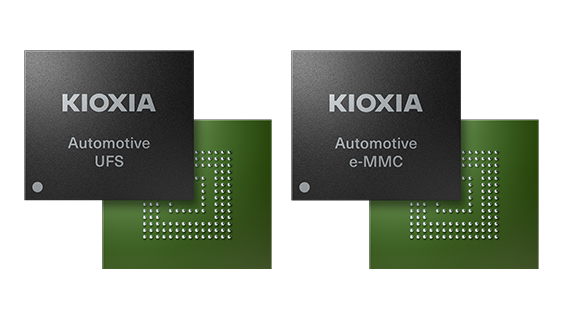
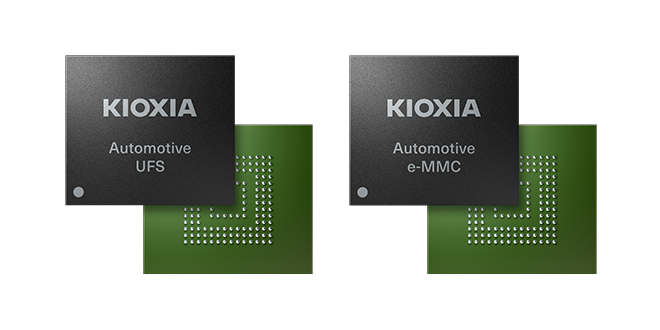
Automotive UFS 4.0 / 4.1 - Designed for a New Era of Mobility
Paving the way for automotive applications of the future, KIOXIA offers a broad capacity lineup of UFS(1) for automotive applications, and is well positioned to support data storage demands of increasingly complex automotive applications. KIOXIA automotive UFS supports a temperature range of -40°C to +105°C, meets AEC-Q100 Grade 2(2) requirements and offers high reliability required by demanding automotive applications.

KIOXIA has led the way in UFS since 2013, being first to sample the technology.*
In 2024, KIOXIA launched the industry‘s first** Automotive UFS 4.0 to power the next generation infotainment and ADAS (advanced driver-assistance system). Automotive UFS 4.0 offers a fast interface speed of up to 46.4Gbps per storage device, enabling faster load time required by automotive application such as richer infotainment, ADAS, and domain controllers.
UFS 4.1 launched in 2025 delivers significant performance and functionality powered by KIOXIA BiCS FLASH™ generation 8 3D flash memory and in-house designed controller technology.
* As of February 8, 2013. KIOXIA survey.
** As of January 30, 2024. KIOXIA survey.
Interview
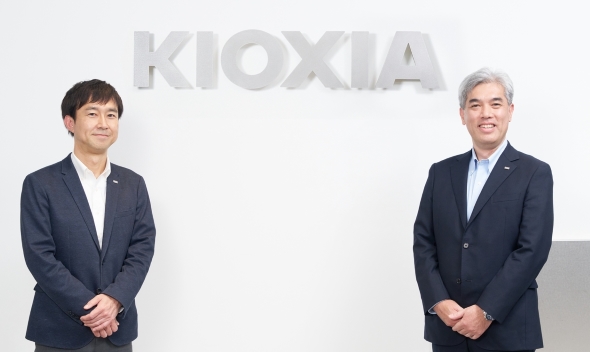
High-speed UFS 4.0 automotive storage - accelerating the evolution of autonomous driving technology
The evolution of autonomous driving technology is leading to an ever-increasing amount of data being used by vehicles. This requires high-performance storage that can cope with the reading and writing of vast quantities of data. In a move that addresses these demands – and creates a better user experience – KIOXIA has developed automotive storage that complies with the new Universal Flash Storage (UFS) 4.0 standard.
Automotive UFS 4.0 / 4.1 Features

Key Features
- High read / write speed
- Support high speed link startup sequence (HS-LSS) technologies
- Serial interface
- Low pin count
- 128GB, 256GB, 512GB, 1TB
- 11.5 x 13mm 153 ball BGA package
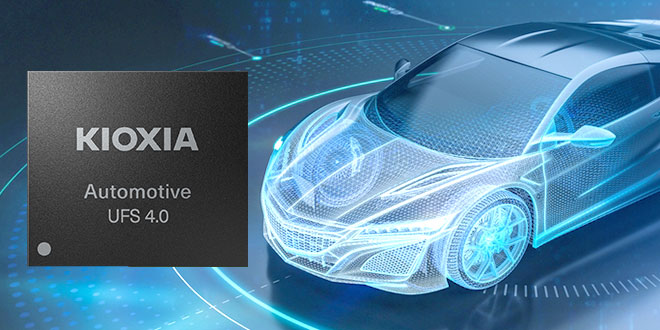
Designed for Automotive Use
- Compliant with IATF16949
- Meets automotive standards (e.g., AEC-Q100 Stress Test Qual Standard)
- Supports PPAP (Production Part Approval Process)
- Extended Temperature Range (e.g., -40°C to +105°C) for Automotive Grade 2
- Low Failure Rate
- Longer lead time for PCN compared to non-automotive grade parts
- Features for automotive (e.g., enhanced solder ball reliability, countermeasures if chip exceeds certain temp, etc.)
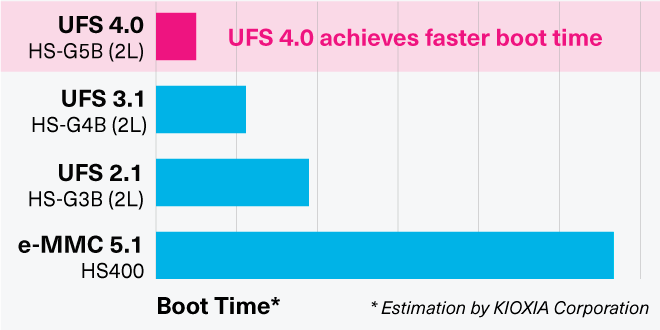
Quick System Start Up
KIOXIA UFS 4.0 / 4.1 automotive devices use HS-LSS (High Speed Link Startup Sequence) to achieve a faster boot time when compared to previous generation devices.
KIOXIA UFS 4.0 / 4.1 Key Technology

High Speed Link Startup Sequence (HS-LSS) Support
With conventional UFS, Link Startup (M-PHY and UniPro initialization sequence) between device and host is performed at low-speed PWM-G1 (3~9Mbps*), but with HS-LSS, it can be performed at faster HS-G1 Rate A (1248Mbps). This is expected to reduce the time for Link Startup by approximately 70% compared to the conventional method.
* PWM-G1 communication speed depends on the host and the device.

WriteBooster Functionality
WriteBooster enhances write performance by utilizing the existing user data area as a temporary SLC buffer without sacrificing capacity. Maximum SLC buffer size can be configured by the host at device configuration and the host can keep writing data to the buffer until the buffer is filled. This feature is enabled dynamically during operation by the host depending on system performance requirements of 5G and other applications.
UFS 4.1 also supports WriteBooster Buffer Resizing and Pinned Partial Flush Mode which provides better flexibility for optimal performance.
Flash Storage Requirements for Automotive application

Next generation automotive systems are becoming more advanced and will continue to integrate more features and functions to enhance the user experience. KIOXIA will drive forward in implementing UFS products that support more advanced infotainment and ADAS (advanced driver-assistance system), more storage for event data recording and more 3D mapping capabilities.
Automotive UFS 4.0 Specs
AEC-Q100 Grade 2
*Table can be scrolled horizontally.
| Capacity | Part Number | UFS version |
Max Data Rate (MB/s) |
Supply Voltage | Operating Temperature (℃) (3) |
Package Size (mm) |
||
|---|---|---|---|---|---|---|---|---|
| VCC (V) |
VCCQ (V) |
VCCQ2 (V) |
||||||
| 128GB | THGJFJT0T25BAB8 | 4.0 | 4640 | 2.4 to 2.7 | 1.14 to 1.26 | - (4) | -40 to 105 | 11.5x13.0x1.2 |
| 256GB | THGJFJT1T45BAB8 | |||||||
| 512GB | THGJFJT2T85BAB5 | 11.5x13.0x1.3 | ||||||
Automotive UFS 4.1 Specs
AEC-Q100 / 104 Grade 2
*Table can be scrolled horizontally.
| Capacity | Part Number | UFS version |
Max Data Rate (MB/s) |
Supply Voltage | Operating Temperature (℃) (3) |
Package Size (mm) |
||
|---|---|---|---|---|---|---|---|---|
| VCC (V) |
VCCQ (V) |
VCCQ2 (V) |
||||||
| 128GB | THGJFJT0E18BAB8 | 4.1 | 4640 | 2.4 to 2.7 | 1.14 to 1.26 | - (4) | -40 to105 | 11.5x13.0x1.2 |
| 256GB | THGJFJT1E28BAB8 | |||||||
| 512GB | THGJFJT2E48BAB8 | |||||||
| 1TB | THGJFJT3E88BAB5 | 11.5x13.0x1.3 | ||||||
Automotive UFS 3.1 / 2.1 & e-MMC
KIOXIA delivers storage solutions for today's automotive applications. UFS 3.1 brings high-speed read/write performance while e-MMC is a proven and established embedded solution for automotive applications.
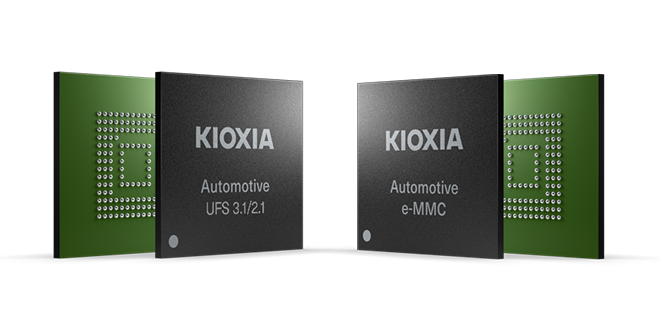
- Universal Flash Storage (UFS) is a product category for a class of embedded memory products built to the JEDEC UFS standard specification.
- Electrical component qualification requirements defined by the AEC (Automotive Electronics Council).
- Tc=115℃ max.
- This product supports dual-supply operation at VCC and VCCQ. VCCQ2 need not be supplied.
- In every mention of a KIOXIA product: product density is identified based on the density of memory chip(s) within the product, not the amount of memory capacity available for data storage by the end user. Consumer-usable capacity will be less due to overhead data areas, formatting, bad blocks, and other constraints, and may also vary based on the host device and application. For details, please refer to applicable product specifications. The definition of 1KB = 210 bytes = 1,024 bytes. The definition of 1Gb = 230 bits = 1,073,741,824 bits. The definition of 1GB = 230 bytes = 1,073,741,824 bytes. 1Tb = 240 bits = 1,099,511,627,776 bits.
Support

Please contact us if you have any technical questions, requests for materials, are interested in samples or purchases of business products (Memory, SSD), etc.



